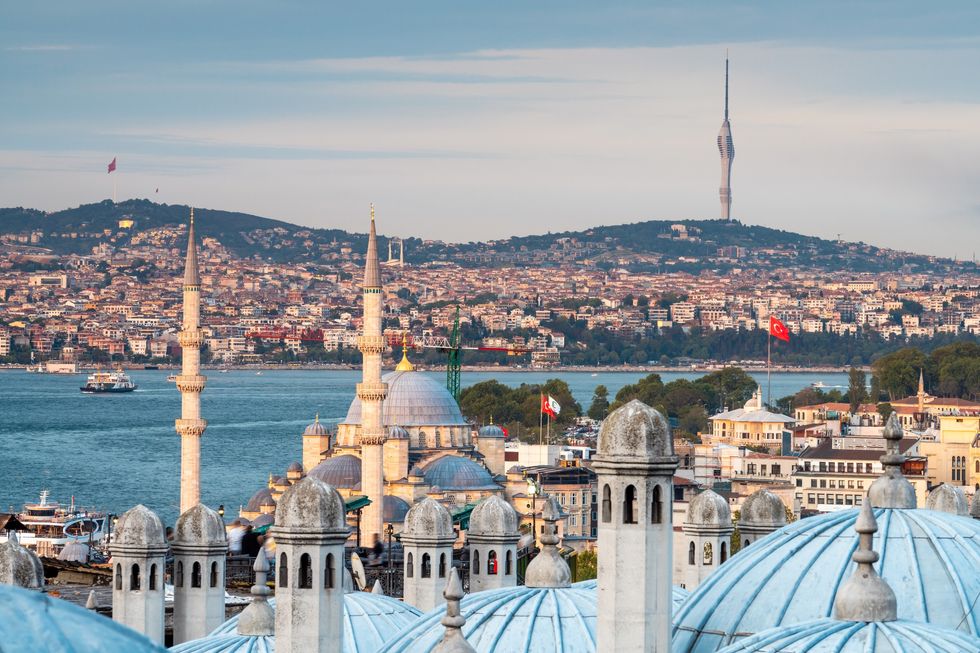Britons visiting Turkey have been issued a warning about their safety. Holidaymakers have been urged to “remain aware” of their surroundings.
The Government has provided new information for Britons travelling to Turkey, telling them that there is a “high threat of terrorist attack globally affecting UK interests and British nationals”.
GOV.UK warned Britons travelling to the holiday hotspot that “terrorists are very likely to try to carry out attacks in Turkey”.
The Foreign, Commonwealth and Development Office (FCDO) advised: “Most terrorist attacks have occurred in southeast Turkey, Ankara and Istanbul. You should remain aware of your surroundings, keep up to date with local media reports and follow the advice of local authorities.
‘Most terrorist attacks have occurred in southeast Turkey, Ankara and Istanbul’
GETTY IMAGES
“Attacks could be indiscriminate including in places visited by foreigners, such as public buildings, places of worship, airports and large public gatherings (including major events, public holidays, and religious occasions).
“There have already been two “significant” attacks in Istanbul this year. Britons were warned: “In February 2024, one person was killed in an armed attack on the Çağlayan courthouse by the terrorist group DHKP/C.
“In January 2024, one person was killed by two gunmen in the Santa Maria Catholic Church in Sariyer, in an attack claimed by Daesh.” In 2022, six people were killed in an explosion in central Istanbul.
British holidaymakers were advised that the proximity could be a cause for concern.
The FCDO explained: “Extremist groups based in Syria, including Daesh and Al-Qaeda linked groups, have the capacity to carry out attacks in neighbouring countries, including Turkey. Daesh has previously targeted border crossings and nearby locations on the Syrian side of the border.”
Visitors to Turkey should consult guidance from the UK Counter Terrorism Policing for information and advice on staying safe abroad and what to do if a terrorist attack occurs. GOV.K also has information on how to reduce your risk from terrorism when abroad.
Britons were also given information from the FCDO on the political situation in Turkey. The Government department said: “Occasional demonstrations can occur in cities and may become violent. Police have used tear gas and water cannons to disperse protests.
“Events in Israel and the Occupied Palestinian Territories have led to heightened tensions in the region and demonstrations are ongoing in locations across Turkey. Large demonstrations have been reported outside diplomatic missions connected to the conflict in major cities, particularly Israeli diplomatic missions in Ankara and Istanbul.”
Britons were told that they should “avoid all demonstrations and leave the area if one develops”. They were advised that local transport routes may be disrupted.
Britons in Turkey must also be aware of the types of crime that take place and how tourists might be affected. Visitors should be aware of street robbery and pickpocketing, drink and food spiking, counterfeit alcohol, sexual assault, and issues with vehicle safety.
LATEST DEVELOPMENTS

Britons were warned: ‘Avoid all demonstrations and leave the area if one develops’
GETTY IMAGES
Britons were warned about sexual assaults taking place: “In 2023, 42 cases of sexual assault, including rape, were reported to British consular staff in Turkey.
“Most sexual assault cases reported to British consular staff in Turkey have happened during summer holidays in coastal tourist areas. Many were committed at night by someone the victim met during the day, including hotel workers. There have also been sexual attacks on minors visiting toilet facilities alone. Be extra vigilant in these situations.”
Turkey isn’t the only popular holiday hotspot British tourists have been warned of in recent days. This comes as hotel guests in Spain could face new restrictions after a drought in Costa Del Sol sparked chaos.
Authorities in Andalusia are reportedly in conversations with hotels to install meters in rooms, in an attempt to cut back on water consumption.
